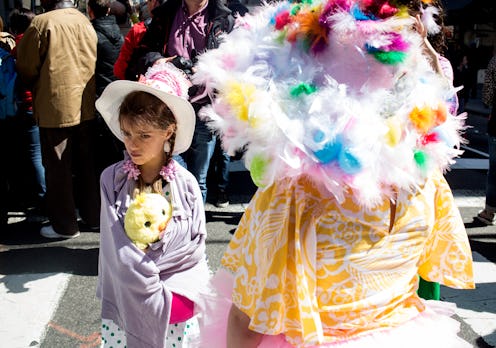News
10 Bunny-less Easter Rituals Around The World
Most people who grew up in America are familiar with the classic Easter rituals — waking up early in the morning to pastel-colored baskets stuffed with light green plastic grass that will inevitably stick to every surface in your house until January. As you likely know, the prodigal Easter basket is stuffed with larger-than-life milk chocolate bunnies and jelly beans of all sizes. But here's what you may not know: outside the United States, many countries have national traditions that you probably never thought to associate with Easter unless you're a true world traveler.
Depending on the culture in the region and the local emphasis — or lack thereof — on religion, Easter rituals around the globe range from serious to whimsical and back again. Customs can be as delicious as spiced Easter buns or as solemn as self-flagellation. Some rituals might even remind you of other popular holidays celebrated in the States — the parades in Guatemala are reminiscent of the Fourth of July, and the dress-up traditions in Sweden and Spain bear a definite resemblance to Halloween costumes — but these customs are distinctly national and definitely festive. So while you may think of Easter as a day of bunnies and bite-size candies, people around the world may be celebrating quite differently.
Here are 10 things to know before you go abroad for Easter Sunday.
Parades (Guatemala)
The Easter celebrations in Antigua, Guatemala, last for a whole week, called Semana Santa. It's one of the country's biggest festivals, where artists create murals on the street called alfombras made of colored sawdust and flower petals. On Good Friday, thousands of people — some carrying statues of Jesus Christ, Virgin Mary, and the apostles — march in a parade through town all afternoon.
Witches (Sweden)
It's traditional for young Swedish girls to dress up as witches on Easter. Why? As legend has it, witches would fly to a nearby mountain the Thursday before Easter to meet with Satan. When the witches descended, Swedes would chase them away by lighting fires. So today, the Swedish light bonfires, and their children walk around town dressed as witches asking for treats.
Flying Church Bells (France)
In France, Belgium, and the Netherlands, the legend is that all the church bells fly out of their steeples on Easter. To feed (pun intended) this legend, French candy stores sell chocolate bells for children. The myth originates from the fact that the church bells are not rung in the days before Easter as a sign of mourning.
Rockets (Greece)
Every Easter on the Greek island of Chios, members of rival churches have a "rocket war," called Rouketopolemos, where they launch thousands of homemade rockets at each other across a valley as the churches hold services.
Flying Kites (Bermuda)
On Good Friday, residents of Bermuda fly kites to represent the ascension of Jesus Christ into heaven.
Spiced Easter Buns (Jamaica)
Originating from English hot cross buns, the Jamaican version is made with molasses and melted cheese and overall deliciousness.
Death Dances (Spain)
In Spain, where Easter is celebrated pretty religiously, the city of Verges is unique. On Maundy Thursday — the day before Good Friday — Spaniards begin by reenacting moments in the life of Jesus Christ. Then the dance takes a darker turn, focusing on Judas' betrayal and Jesus' death.
Burning Effigies (Mexico)
In Mexico, celebrants burn effigies of Judas, who betrayed Jesus and led to his death, which is the backstory for the celebration of Easter. On the Saturday before Easter, Holy Saturday, Mexicans gather at local plazas to watch papier-mâché versions of Judas being exploded.
Flying Pots (Greece)
To continue the flying theme, on the Greek island of Corfu, residents engage in the "Pot Throwing" custom at 11 a.m. on Holy Saturday. In this custom, they throw clay pots from their homes onto the ground to celebrate the anticipated resurrection of Jesus.
Knocking Eggs (America)
In the deep south, especially Louisiana, Americans celebrate Easter a little differently — by knocking their Easter eggs together with the intention of cracking them. Two people knock their eggs together and whoever cracks first is the loser. Some communities even hold Egg Knocking Contests.
Images: Getty, Giphy (1)
